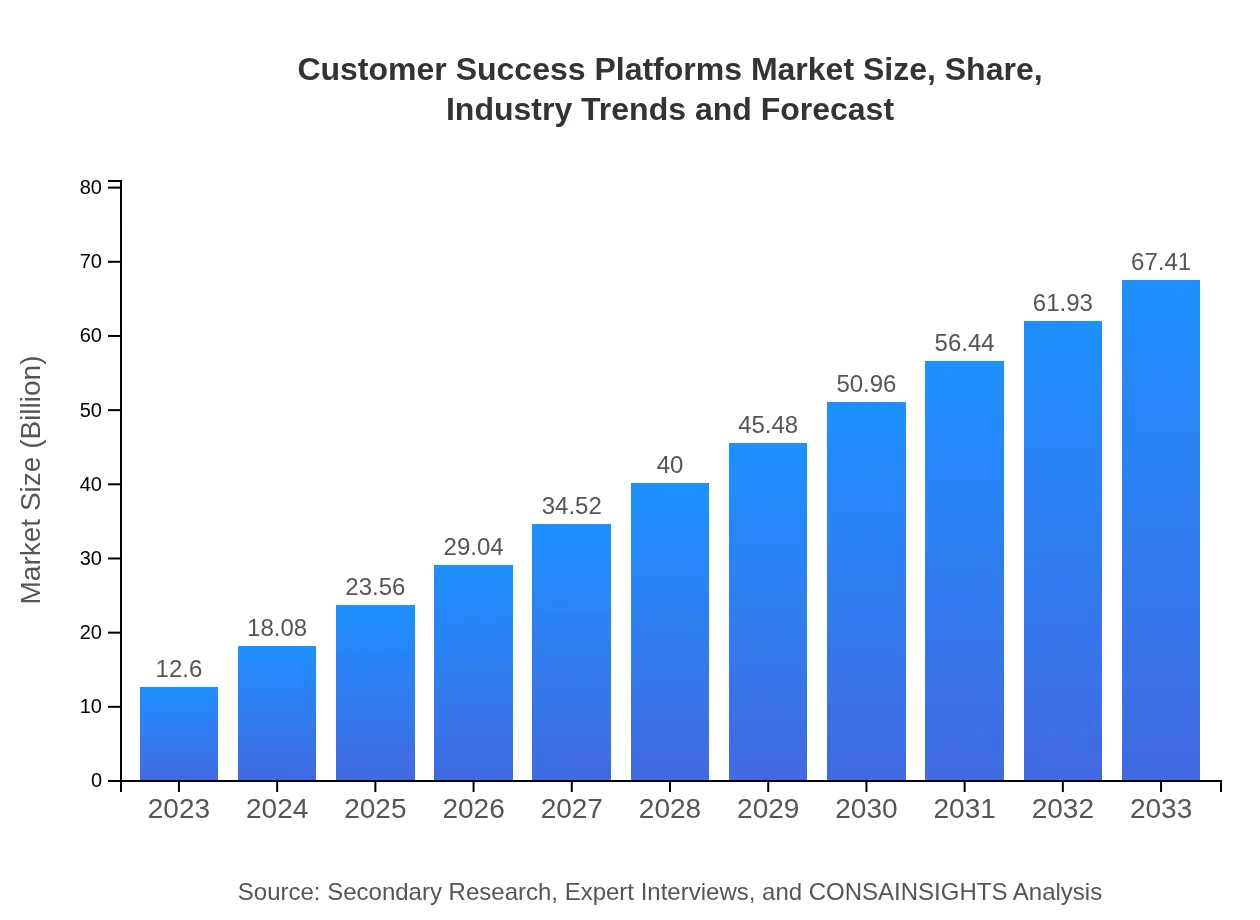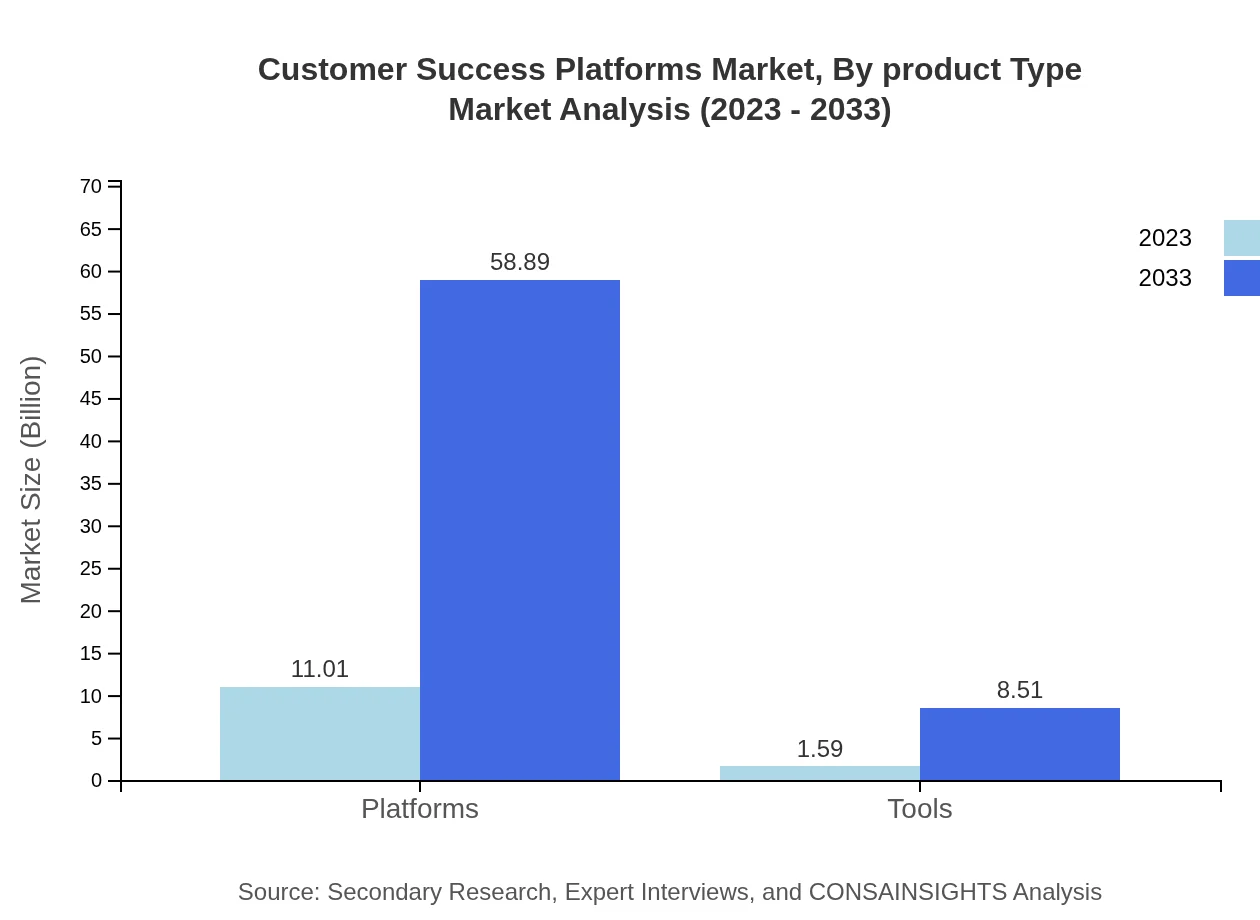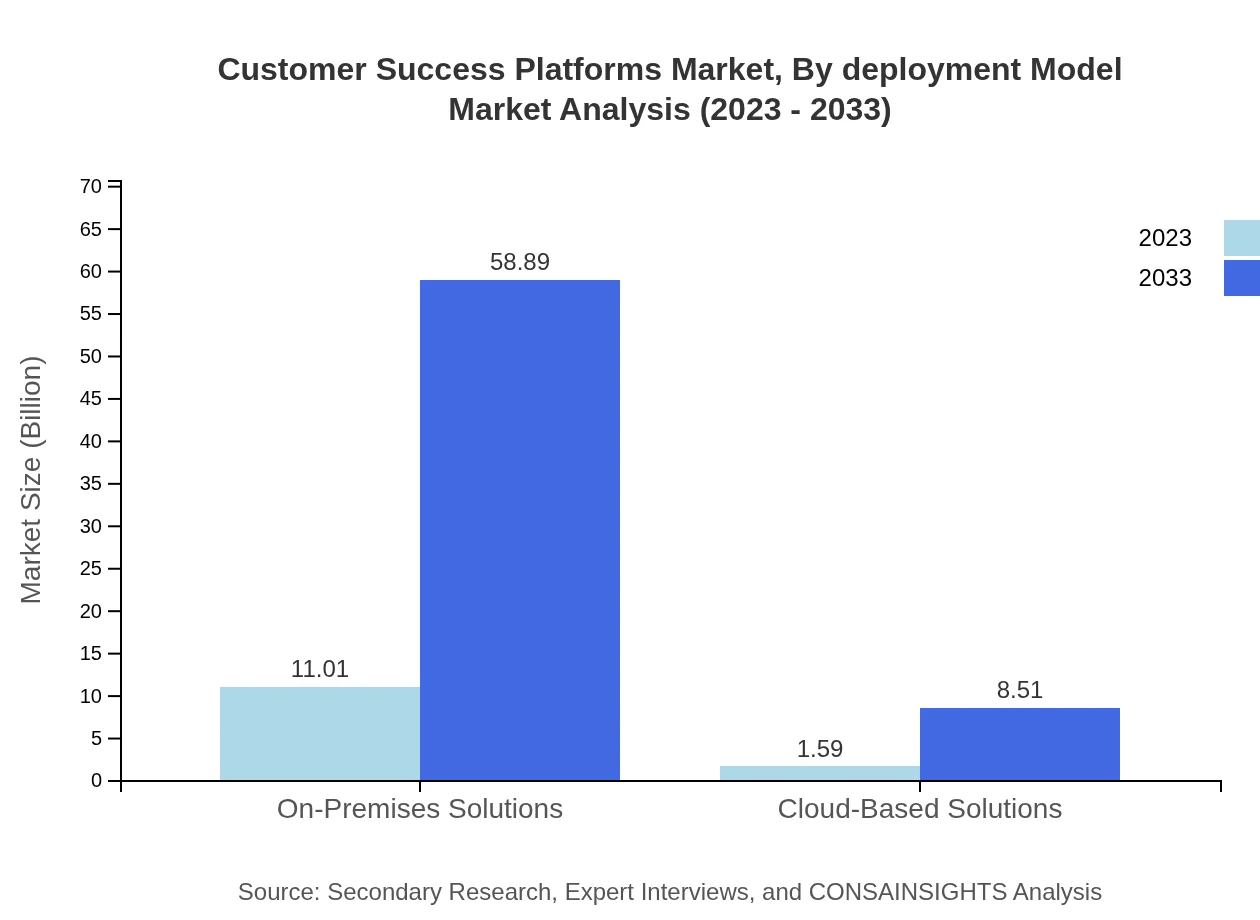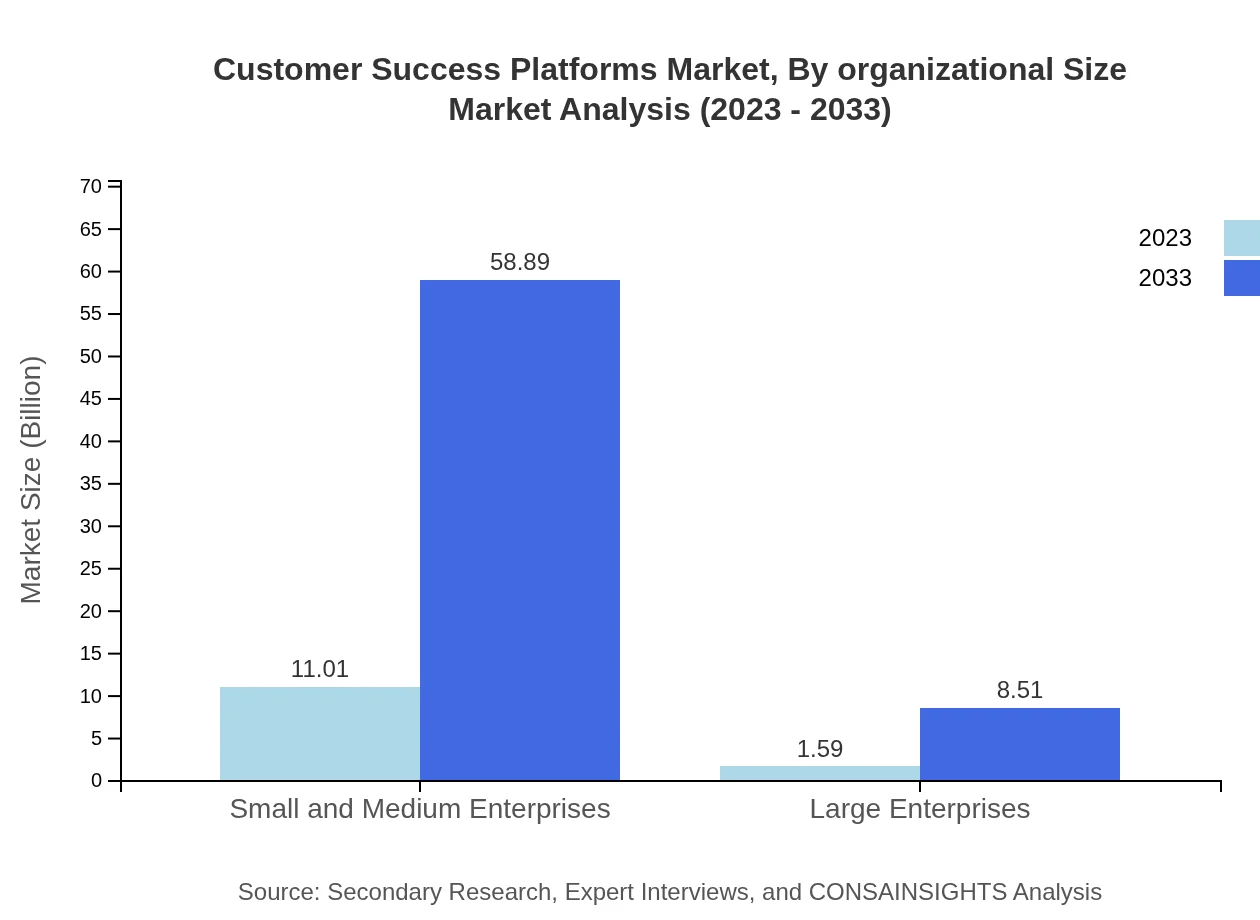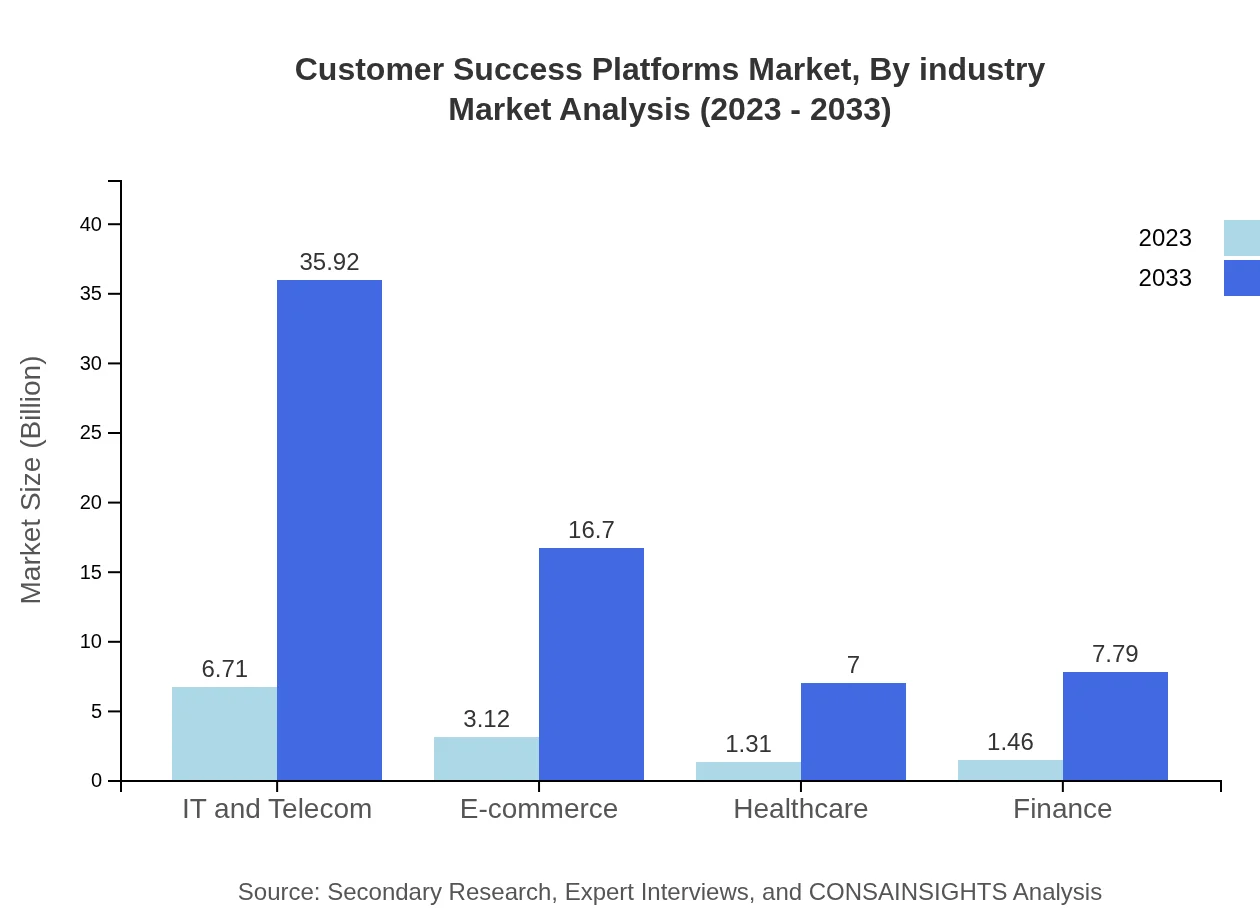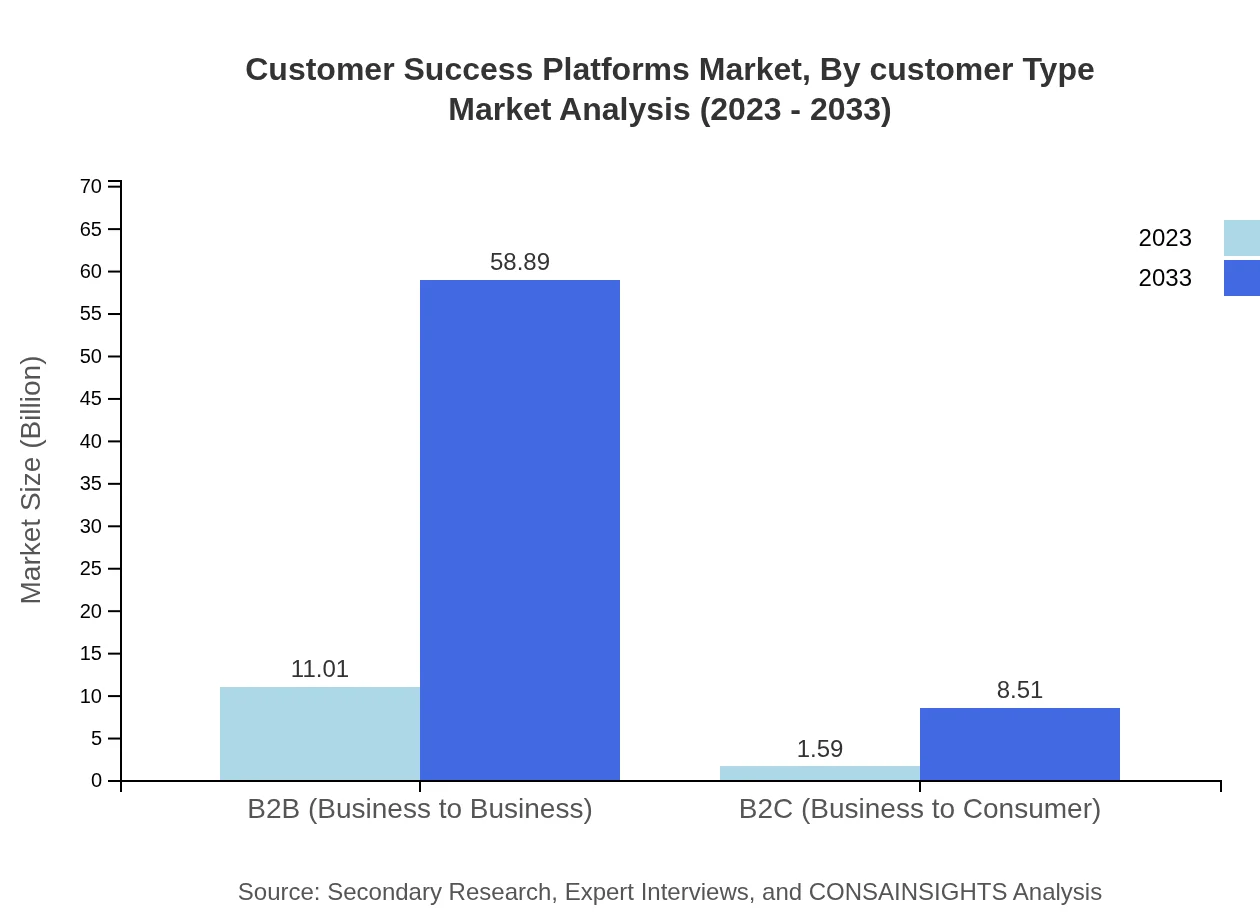Customer Success Platforms Market Report
Published Date: 02 February 2026 | Report Code: customer-success-platforms
Customer Success Platforms Market Size, Share, Industry Trends and Forecast to 2033
This report provides a comprehensive analysis of the Customer Success Platforms market from 2023 to 2033, covering market conditions, size, growth trends, segmentation, regional insights, technology advancements, and key players in the industry.
| Metric | Value |
|---|---|
| Study Period | 2023 - 2033 |
| 2023 Market Size | $12.60 Billion |
| CAGR (2023-2033) | 17.3% |
| 2033 Market Size | $67.41 Billion |
| Top Companies | Salesforce, HubSpot, Zendesk, Freshworks, Zoho |
| Last Modified Date | 02 February 2026 |
Customer Success Platforms Market Overview
Customize Customer Success Platforms Market Report market research report
- ✔ Get in-depth analysis of Customer Success Platforms market size, growth, and forecasts.
- ✔ Understand Customer Success Platforms's regional dynamics and industry-specific trends.
- ✔ Identify potential applications, end-user demand, and growth segments in Customer Success Platforms
What is the Market Size & CAGR of Customer Success Platforms market in {Year}?
Customer Success Platforms Industry Analysis
Customer Success Platforms Market Segmentation and Scope
Tell us your focus area and get a customized research report.
Customer Success Platforms Market Analysis Report by Region
Europe Customer Success Platforms Market Report:
Europe's market is experiencing a surge, with the size expected to grow from $4.38 billion in 2023 to $23.42 billion by 2033. The implementation of stringent customer data regulations is prompting businesses to adopt Customer Success Platforms for better compliance and relationship management.Asia Pacific Customer Success Platforms Market Report:
In the Asia-Pacific region, the Customer Success Platforms market is projected to grow from $2.38 billion in 2023 to $12.72 billion by 2033. The rapid digital transformation in industries such as retail and telecommunications is propelling this growth, alongside increasing investments in technology.North America Customer Success Platforms Market Report:
North America continues to lead the Customer Success Platforms market, with a reported size of $4.37 billion in 2023, anticipated to reach $23.39 billion by 2033. High technology adoption rates and a strong emphasis on customer-first strategies are key factors in this region's development.South America Customer Success Platforms Market Report:
South America faces a growing interest in Customer Success Platforms, with market size expected to expand from $0.62 billion in 2023 to $3.30 billion by 2033. This growth is fueled by the escalating need for enterprises to enhance customer retention and operational efficiencies, particularly in emerging sectors.Middle East & Africa Customer Success Platforms Market Report:
The Middle East and Africa market for Customer Success Platforms is projected to increase from $0.86 billion in 2023 to $4.58 billion by 2033. Factors such as rising digital innovation and an increasing focus on customer experience metrics are driving this growth across various industries.Tell us your focus area and get a customized research report.
Customer Success Platforms Market Analysis By Product Type
The market is consolidated significantly under 'Platforms' which encompasses $11.01 billion in 2023 and is projected to escalate to $58.89 billion by 2033. This segment holds a whopping share of 87.37% in 2023 and remains pivotal as organizations prioritize comprehensive, integrated solutions to manage customer relationships effectively.
Customer Success Platforms Market Analysis By Deployment Model
In 2023, On-Premises Solutions account for $11.01 billion, which is forecasted to elevate to $58.89 billion by 2033, maintaining an 87.37% market share. Cloud-Based Solutions are also gaining traction, with a modest growth from $1.59 billion to $8.51 billion over the same period, which reflects a steady move towards cloud technologies.
Customer Success Platforms Market Analysis By Organizational Size
Small and Medium Enterprises (SMEs) dominate the market with a size of $11.01 billion in 2023, rapidly advancing to $58.89 billion by 2033, holding an 87.37% market share. Large Enterprises also show growth potential from $1.59 billion to $8.51 billion, reflecting their increasing need for tailored customer solutions.
Customer Success Platforms Market Analysis By Industry
The IT and Telecom sector leads the market with a substantial size of $6.71 billion in 2023, expected to grow to $35.92 billion by 2033. Close competitors include E-commerce with $3.12 billion, advancing to $16.70 billion, and Healthcare, which expands from $1.31 billion to $7 billion, reflecting the critical need for customer engagement across various sectors.
Customer Success Platforms Market Analysis By Customer Type
The B2B segment is predominant, valued at $11.01 billion in 2023, expected to rise to $58.89 billion by 2033, exhibiting an 87.37% share. The B2C sector, currently at $1.59 billion, is expected to reach $8.51 billion, indicating a notable increase in consumer-focused strategies.
Customer Success Platforms Market Trends and Future Forecast
Tell us your focus area and get a customized research report.
Global Market Leaders and Top Companies in Customer Success Platforms Industry
Salesforce:
Salesforce is a leading player in the Customer Success Platforms market, offering comprehensive cloud-based solutions designed to enhance customer relationship management, analytics, and automations.HubSpot:
HubSpot provides an all-in-one marketing, sales, and customer service platform that helps businesses achieve effective customer engagement and satisfaction.Zendesk:
Zendesk offers innovative customer service software and solutions, empowering companies to engage with customers more effectively through data-driven insights.Freshworks:
Freshworks specializes in customer engagement software, delivering solutions that streamline customer interactions and enhance satisfaction across different channels.Zoho:
Zoho is well-known for its suite of online productivity tools, which includes customer relationship management systems designed for small and medium businesses.We're grateful to work with incredible clients.









FAQs
What is the market size of customer Success Platforms?
The market size of customer success platforms is projected to reach $12.6 billion by 2033, growing at a CAGR of 17.3% from its current valuation. This growth reflects the increasing importance of customer relationship management in businesses.
What are the key market players or companies in the customer Success Platforms industry?
Key players in the customer success platforms market include Salesforce, Gainsight, Zendesk, HubSpot, and Freshdesk. These companies are leading the charge with innovative solutions that enhance customer engagement and satisfaction.
What are the primary factors driving the growth in the customer Success Platforms industry?
Primary growth factors include an increase in customer-centric business models, the push for improved customer experience, and advancements in technology enabling better customer data analytics and targeted strategies.
Which region is the fastest Growing in the customer Success Platforms?
The fastest-growing region in the customer success platforms market is Europe, anticipated to grow from $4.38 billion in 2023 to $23.42 billion by 2033, with significant expansion also expected in the Asia Pacific region.
Does ConsaInsights provide customized market report data for the customer Success Platforms industry?
Yes, ConsaInsights offers customized market report data tailored to the specific needs of the customer success platforms industry. This allows clients to access detailed insights reflecting their unique market dynamics.
What deliverables can I expect from this customer Success Platforms market research project?
Deliverables include comprehensive market analyses, trend reports, competitive landscape assessments, and detailed segmentation studies. Clients will receive curated insights crucial for strategic decision-making.
What are the market trends of customer Success Platforms?
Market trends include growing automation in customer interactions, an emphasis on data-driven insights for personalized customer experiences, and an increasing shift toward cloud-based solutions to improve service efficiency.

